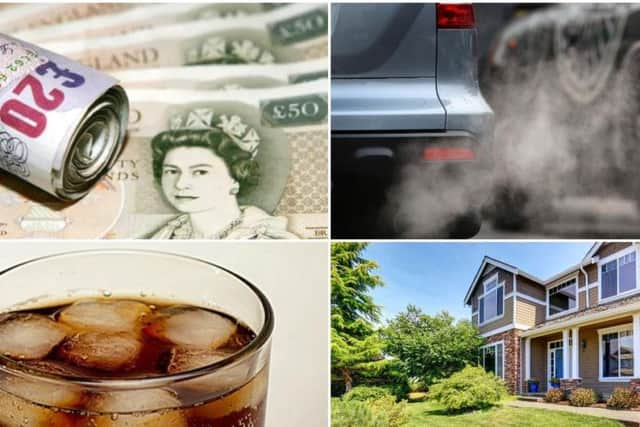Tax changes: Five tax increases and cuts which may affect you from April 1
and live on Freeview channel 276
That is, unless you drink sugary drinks and drive a high-pollution diesel.
New tax: Sugar tax
Cans of fizzy pop look set to cost as much as 8 pence more as the new sugar tax comes into force this April.


Advertisement
Hide AdAdvertisement
Hide AdThe Soft Drinks Industry Levy (SDIL), also known as ‘the sugar tax’, is set to make soft drinks companies pay a charge for drinks with added sugar after it was announced in the 2016 Budget in a bid to tackle rising obesity rates.
The new tax will make soft drinks companies pay a charge for drinks with added sugar with two bands for deciding on the tax increase.
The amount of tax depends on the total sugar content of the drink with companies having to pay 18p per litre on tax if the drink has 5g of sugar or more per 100ml, or 24p per litre if the drink has 8g of sugar or more per 100ml.
The Government has said this is not a tax on consumers, meaning companies do not have to pass the charge on to customers; however, prices of sugary soft drinks are expected to rise. Under the new tax system a 330ml can of Coca Cola, Old Jamaican Ginger Beer, Pepsi and Dr Pepper are expected to cost 8p more; and a 330ml can of Sprite, Fanta and Schweppes Indian Tonic Water could cost 6p more. A litre bottle of pop could cost as much as 24p extra. The new sugar tax is a welcome step for health campaigners. But not all popular sugary drinks are set to be hit with the extra tax.


'Tax rise': Dividends allowance reduced
Advertisement
Hide AdAdvertisement
Hide AdThe dividend allowance which was introduced at £5,000 in 2016/17 is to be reduced to £2,000 for 2018/19 onwards.
This would mean an extra tax liability of £225 for a basic rate taxpayer, £975 higher rate and £1,143 additional rate taxpayers.
Tax changes: Diesel cars
New Diesel cars bought last year will be subject to a charge due to new bands from April 1, if they fail to meet the latest Euro 6 emissions standards in real-word testing.
The rise for a Ford Fiesta could be as little as £20-30, but a Porsche Cayenne would be hit with a rise in the hundreds of pounds. The changes don't apply to commercial vans or vehicles, only cars.
Advertisement
Hide AdAdvertisement
Hide AdDiesels with emissions of 1-50g/km diesels will cost £25, 51-70 will cost £105. And at the top end it's £2070 for highly polluting car like a Porsche Cayenne.
All cars that cost more than £40,000 outright will attract an extra premium fee of £310 for years two to six of ownership, regardless of emissions.
Mortgage interest on residential property
The restrictions on the treatment of mortgage interest on residential property lettings increase for 2018/19: Only 50% of any interest paid will be fully deductible from rental income; relief for the other 50% will be given as a basic rate tax reducer.
The proportions were 75% and 25% in 2017/18 so higher and additional rate taxpayers will see an increased tax liability, according to Deloitte.
Advertisement
Hide AdAdvertisement
Hide AdThis may be more than expected (and could affect basic rate taxpayers too in some circumstances) as only the deductible interest is taken into account for calculating the taxable income. So for example those with income over £50,000 who have a child benefit clawback will see this affected too, as will those whose income is over £100,000 meaning their personal allowance is tapered.
PAYE tax rates and thresholds 2018 to 2019
Employee personal allowance is now £11,850 per year (up from £11,500)
UK basic tax rate 20% on annual earnings above the PAYE tax threshold and up to £34,500 (An extra £1,000 on last year)
Starting rate limit remains at £5,000
Basic rate band is now at £1 – £34,500 from the previous £1 – £33,500
Higher rate band is now at 40% of earnings over £34,501 – £150,000 (£1,000 extra)
Additional rate band stays the same at 45% on annual earnings over £150,000